#indus metal
Explore tagged Tumblr posts
Text
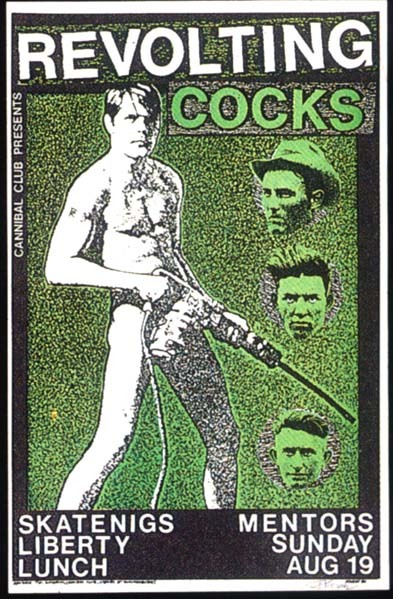
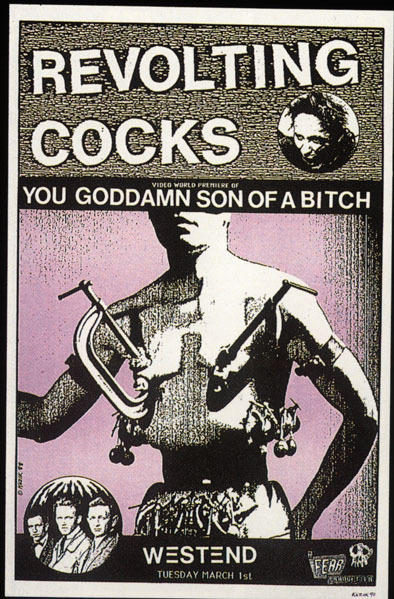
REVOLTING COCKS x FRANK KOZIK
#revolting cocks#rev co#ministry#al jourgensen#tour poster#poster design#concert poster#gig poster#music posters#poster art#gig posters#posters#poster#affiche#industrial band#indus metal#industrial music#industrial#indus#frank kozik#kozik#skatenigs
716 notes
·
View notes
Text
youtube
AUTHOR & PUNISHER Un groupe de dark electro/ industriel ricain avec une tendance doom. J'ai bien accroché à l'ambiance sombre du truc, ça m'a rappellé les premiers NIN niveau de sons, peut être les premiers Wumpscut… Vu ce week end à Rock in Bourlon.
0 notes
Text
just wipe your own ass and shut your mouth 🫶
4 notes
·
View notes
Text
Avenged Sevenfold: Life Is but a Dream
Aujourd'hui sur Blog à part – Avenged Sevenfold: Life Is but a Dream Ma dernière chronique d'Avenged Sevenfold date d'il y a treize ans. Comment leur son a-t-il changé sur ce nouvel album, Life Is but a Dream? Beaucoup. #nawakmetal
Avenged Sevenfold est un nom que les plus anciens d’entre vous se rappelleront peut-être avoir vu sur ce blog: j’avais chroniqué en son temps l’album Nightmare, mais c’était il y a treize ans. La question est donc, comment leur son a-t-il changé sur ce nouvel album, Life Is but a Dream? La réponse est « beaucoup ». Le groupe américain, fondé en 1999, a acquis depuis une réputation d’exploration…

View On WordPress
2 notes
·
View notes
Text
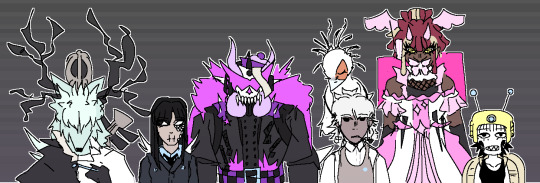



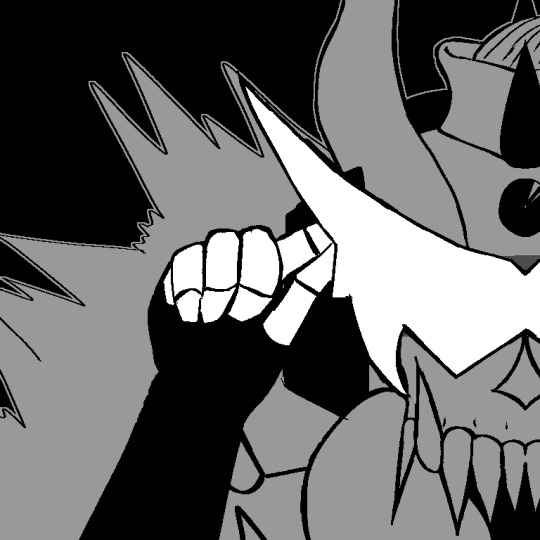


planeswalker association heads stuff for more Tag Establishment
most of these are stills from the animation thing i’m working on but most of you people haven’t seen that so it doesn’t matter also, i guess i missed the context image for the Third Image but lager’s big coat has big embroidered text that says FOLLOW THE LEADER on the back with little leashes that drag behind him
#oc#ocs#original character#original characters#character design#relicverse#planeswalker association#sinai clan#ging#indus sinai#julien terepas lager#brand agma monia#lotte#jinani nine#metal fuckface
4 notes
·
View notes
Text
The Gitxaaa Nation has filed a lawsuit against the provincial govt’s “free entry” mining claim staking policy. And the British Columbia Supreme Court (BCSC) has begun hearing arguments in the case.
1 note
·
View note
Photo
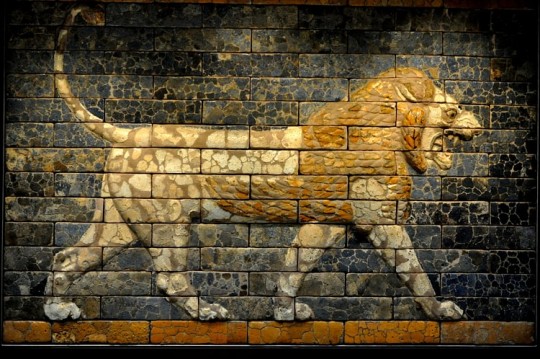
Mesopotamian Art and Architecture
Ancient Mesopotamian art and architectural works are among the oldest in the world, dating back over 7,000 years. The works first appear in northern Mesopotamia prior to the Ubaid Period (c. 5000-4100 BCE) and then developed in the south during the Uruk Period (4100-2900 BCE) in Sumer which established the first historical civilization.
According to some scholars, the works of the Indus Valley Civilization (c. 7000 to c. 600 BCE) pre-date those of Mesopotamia, but the Indus Valley developments do not appear until the Early Harappan Period (c. 5500-2800 BCE) by which time Mesopotamian works were already established. Early artwork and construction are evidenced in northern Mesopotamia at sites such as Göbekli Tepe (c. 10,000 BCE) and Ҫatalhöyük (c. 7500 BCE), both in modern-day Turkey, and Tell Brak (c. 6500-5000 BCE), in Syria.
The development of these works then progressed through the following eras, though, owing to space limitations, the Hittite and Kassite periods will not be addressed:
Ubaid Period – c. 5000-4100 BCE
Uruk Period – 4100-2900 BCE
Early Dynastic Period – 2900-2334 BCE
Akkadian Period – 2334-2218 BCE
Ur III Period – 2047-1750 BCE
Old Babylonian Period – c. 2000-1600 BCE
Hittite Period – 1700-1200 BCE
Kassite Period – c. 1595 to c. 1155 BCE
Assyrian Period – c. 1307-912 BCE
Neo-Assyrian Period – 912-612 BCE
Neo-Babylonian Period – 626-539 BCE
Achaemenid Persian-Sassanian Persian Period – c. 550 BCE to 651 CE
Artworks included reliefs, sculpture, statuary cast in metal, ceramics, jewelry, cylinder seals, stele & monuments, obelisks, and wall paintings. Mesopotamian monumental architecture is epitomized by the ziggurat, but the Sumerians were also responsible for the first large-scale palaces and temples, as well as urban planning, the arch, canals, and aqueducts, landscaped gardens, and architectural ornamentation. These early innovations would become more refined in the region through succeeding periods and influence the works of other cultures in the Near East and Mediterranean regions.
Earliest Sites & Base Materials
Although the Göbekli Tepe site is dated to c. 10,000 BCE, the first permanent settlements in that area are thought to have been established earlier, and, possibly, for the sole purpose of building the structure which most scholars believe was a temple. Göbekli Tepe is among the earliest sites, along with others such as Nevalı Çori (also in modern-day Turkey), to feature monumental architecture – including the oldest known megaliths in the world at Göbekli Tepe – as well as reliefs.
Architecturally, the site is comprised of circular areas and rectangular buildings with T-shaped pillars of limestone, some carved with images of wildlife in low and high relief. There is little evidence of human activity in the sculptures which seem to emphasize the natural world and, in some interpretations, the people's relationship with their gods. Some scholars associate the site with the later settlement of Ҫatalhöyük, though this claim has been challenged as the design of Göbekli Tepe, and the tools found there, differ from the later site.
Whatever purpose Göbekli Tepe originally served, it was a communal site associated with ritual, while Ҫatalhöyük was entirely residential. No public buildings have been found at the site which is comprised of tightly clustered mudbrick residences accessed by ladders or steps from a hole in the roof. Artwork from the site includes murals and statuary – such as the famous Seated Woman of Ҫatalhöyük – as well as ceramics. The artwork seems to focus on the natural world and the concept of fertility as several pieces represent female figures and erect phalluses.
The people of Ҫatalhöyük used clay, limestone, marble, and other materials for their statuary and paint created from natural substances. The figurines, statuary, and murals are usually interpreted as representing religious concepts, but this claim is not universally accepted. There is no evidence of urban planning at the site; it seems to have developed organically with buildings attached to each other and people using the rooftops for communal activities and movement as there are no streets, courtyards, or public squares.
Continue reading...
120 notes
·
View notes
Text
Alien's introduction
Hi ! I'm Alien from Freaks System. I'm 21yo, i'm a boy/femboy (he/it/its), and an alienkin. I'm an anarchist (far left wing), neuroA, queer, veggy, and i support movment like BLM, ouigours, free palestine etc... i like weirdcore, goth, liminal ahesthetic and other things that explore with counciousness and feeling to be lonely, apart, disconected, dissociating, hallucinating, rotten, broken, empty, or glitching in and experimental way in art. I do video games and music with my girlfriend and i do writting alone. My favorite band ever is Black Dresses (indus, glitch pop, noise pop, metal, rap, rock, electro, alternative, experimental), i am obsess with it
#alienkin#transgender#did system#did osdd#anarchism#anarchist#neurodivergent#weirdcore#goth#liminal#denpacore#black dresses#devi mccallion#ada rook#industrial#glitch#noise rock#experimental#lgbtq#queer
7 notes
·
View notes
Text
HELLO EVERYONE! I SHALL NOW REVEAL THE BRAKCETS
First up
Wait
MOST FUCKABLE GENTLE GIANT
The A bracket (finished)
Battle 1-16
(most submissions in form 1 and most submissions in form b)
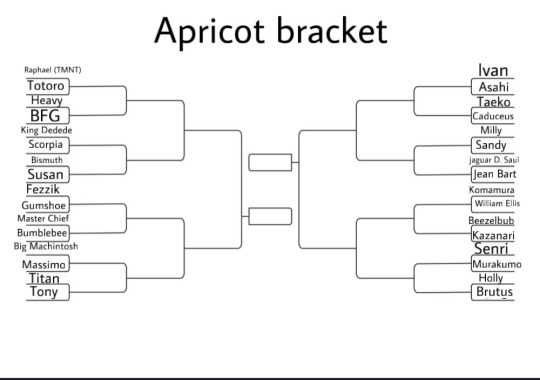
Starts Friday the 9th of June. 5pm CET. The brackets will be posted between the 9-10th of June.
Side A, 9th of June. 5pm to 8pm cet
Raphael Hamato (rise of the TMNT) vs Totoro (my neighbor Totoro)
Heavy (team fortress 2) vs Big Friendly Giant (BFG)
King Dedede (Kirby) vs Scorpia (She-ra)
Bismuth (Steven universe) vs Susan Murphy (monsters vs aliens)
Fezzik (the princess bride) vs Dick Gumshoe (ace attorney)
Master Chief (halo) vs Bumblebee (bumblebee)
Big Macintosh (my little pony: friendship is magic) vs Massimo Marcovaldo (Luca)
The titan (the owl house) vs Tyson (Percy Jackson)
Side B, 10th of June, 5pm to 8pm CET
Ivan Bruel (miraculous ladybug) vs Asahi Azumane (haikyuu)
Takeo Goda (ore monogatari) vs Caduceus Clay (critical role)
Milly Thompson (tri-gun) vs Sandy (Lego monkie kid)
Jaguar D. Saul vs Jean Bart (one piece)
Komamura (bleach) vs William Ellis (identity v)
Beelzebub (obey me) vs Kazanari Genjuurou (symphogear)
Senri (plus anima) vs Murakumo (rune factory 5)
Holly (super lesbian animal rpg) vs Brutus Feels (Kane and feels)
The B bracket (finished)
Battles 17-32
Characters who have returned from the spring bracket and from fandoms I’ve personally interacted with. So the spring bracket but we blacklisted big man
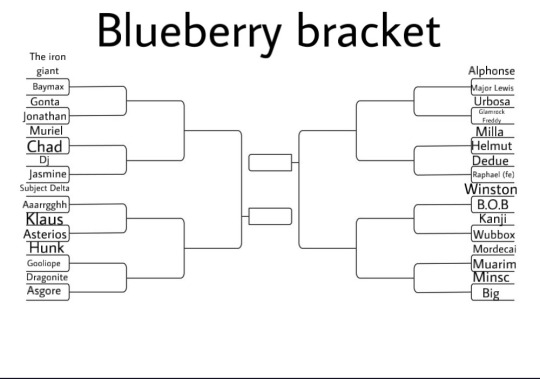
Date: Tuesday 13/6 to Wednesday 14/6, between 5pm to 8pm CET
Side A (Tuesday)
The iron giant vs Baymax (big hero 6)
Gonta gokuhara (danganronpa) vs Jonathan Joestar (JoJo’s bizarre adventure)
Dj (total drama) vs Yasutora “Chad” Sado (bleach
Muriel (the arcana) vs Jasmine (total drama)
Subject Delta (bioshock) vs aaarrrgghh (trollhunters)
Klaus Von Reinherz (kekkai sensen) vs Asterios (fate grand order)
Hunk (Voltron) vs Gooliope Jellington (monster high)
Dragonite (Pokémon) vs Asgore Dreemurr (undertale)
Side B (Wednesday)
Alphonse Elric vs Major Lewis Armstrong (full metal alchemist)
Urbosa (legend of Zelda) vs Glamrock Freddy (five nights at Freddy’s)
Milla Vodello vs Helmut Fullbear (psychonauts)
Dedue Molinaro vs Raphael Kirsten (fire emblem: three houses)
Winston vs B.O.B (overwatch)
Kanji Tatsumi (persona) vs Common Wubbox (my singing monsters)
Mordecai vs Muarim (fire emblem: gay rights path of radiance/radiant dawn)
Minsc & Boo (baldur’s gate) vs Big the cat (sonic the hedgehog)
C BRACKET (ongoing)
Battles 33-48
Those who fell in between the A and the D bracket. So this one has some pretty chaotic matchups
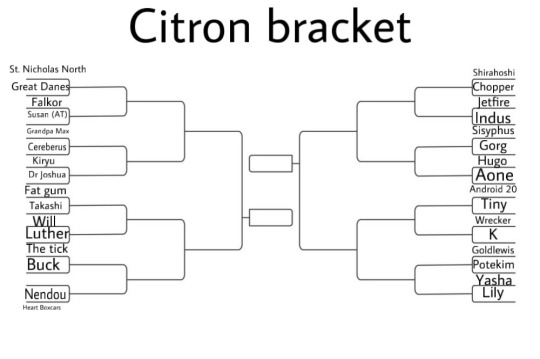
Date: Sunday the 18th to Monday the 19th, 5pm to 8pm cet
A bracket: Sunday
Nicholas St North (rise of the guardians) vs Grear Danes (irl)
Falkor the good luck dragon (the never ending story) vs Susan Strong (adventure time)
Grandpa Max (Ben 10) vs Cerberus (Greek mythology)
Kiryu Kazuma (yakuza) vs Dr Joshua Strongbear Sweet (Atlantis)
Fatgum (my hero academia) vs Takashi Morinozuka (ouran highschool host club)
Will Powers (ace attorney) vs Luther (Detroit: become human)
The Tick (the tick 1994) vs Evan Buck Buckley (911 on fox)
Riki Nendou (saiki k) vs Hearts Boxcars (homestuck)
Side B (Monday)
Shirahoshi vs Tony Tony Chopper (one piece)
Jetfire/skyfire (transformers) vs Indus Tarbella (epithet erased)
Sisyphus (hades) Vs Grog Strongjaw (critical role)
Hugo the abominable snowman (looney tunes) vs Aone Takanobu (Haikyuu)
Android 16 (dragon ball) vs Tiny (ever after high)
Wrecker (Star Wars: the bad batch) vs K (virtues last reward)
Goldlewis Dickinson vs Potemkin (guilty gear)
Yasha Nydoorin (critical role) vs Lily Bowen (fall out)
D BRACKET
Battles 49-64
Aka the one where the contestants sadly got the least amount of votes)

Date: Thursday 22/6th to Friday 23/6th 5pm to 8pm CET
Side A: Thursday
lain chu (dragon hunters) vs Panda (tekken)
Isaroth (genshin impact) vs Bizarro (DC red hood and the outlaws)
Jienji (Inuyasha) vs Jackie Wells (cyberpunk 2077)
Looks to the moon (rain world) vs Jogu (naruto)
Bane Perez (identify V) vs Zinnia (super lesbian animal rpg)
Vulkanon (rune factory 4) vs Argus (Greek mythology)
Mountain (ark knights) vs Taiga Saejima (yakuza)
Abbi (Omori) vs Gorem (bakugan)
SIDE B: Friday
Junko (storm hawks) vs Hajin (monstress)
Gylph (super lesbian animal RPG) vs Bongchun (Bongchun bride)
Fitz Fellow (detective grimoire) vs Bubbles (questionable content)
Dubo (omega strikers) vs Bob the titan (Percy Jackson)
Otto the giant water dog (wondla) vs Kurita Ryoukan (Eyeshield 21)
Mele the Horizons Roar (ishura) vs Gentle Bear (dog island)
The Selfish Giant vs Banjo Lilywhile (the hogfather)
Livio the double fang (trigun) vs Hank McCoy (x-men)
I will make propaganda master posts and if you want to add, just use the ask box or dm me with propaganda for one of the characters who’s going to participate. But that’s all!
May the best gentle giant WIN!
SECOND CHANCE BATTLES FOR ROUND 1
27/6, apricot bracket
Battle 1
Battle 2
Battle 3
Battle 4
29/2, shavedown of the apricot bracket
The battle
1/7, blueberry bracket
Battle 1
Battle 2
Battle 3
Battle 4
3/7, shavedown
The battle
4/7, citron bracket
Battle 1
Battle 2
Battle 3
Battle 4
5/7, shavedown
7/7, durian bracket
Battle 1
Battle 2
Battle 3
Battle 4
8/7, shavedown
The (un)official GGSmod messed up someone’s name post
The crime list
Ask game
#gentle giant swag#tumblr tournament#fandom tournament#tumblr bracket#fandom bracket#my neighbor totoro#bioshock#Kirby#jjba#ace attorney#trigun#total drama#danganronpa#the arcana#the iron giant
96 notes
·
View notes
Text
Mentally I am not the best so
Have this
*still stream their music and your soft if you disagree”
Extra things
You can’t leave, there needs to be at least 10 minutes of music discussion. There’s only one bottle of aloe Vera drink. You can not bring with you outside items like a book. But there is a computer that has league of legends. Though you can only play it for 10 minutes max.
35 notes
·
View notes
Text
The Song of Songs has quite recently (1973) been assigned to the time of Solomon by a distinguished Hebraist, Professor Chaim Rabin of the Hebrew University in Jerusalem. For more than forty years now evidence has been accumulating for some kind of relationship between the cities of the Harrapan civilization of the Indus Valley and lower Mesopotamia during the latter part of the third millennium B.C. and into the second (cf. C. J. Gadd, PBA, 1932). Rabin (205) called attention to the few dozen typical Indus culture seals which have been found in various places in Mesopotamia, some of which seem to be local imitations. He suggested that these objects were imported not as knickknacks, but because of their religious symbolism by people who had been impressed by Indus religion. To the examples of Indus type seals in Mesopotamia cited by Rabin (217n2), we may add a dated document from the Yale Babylonian Collection, an unusual seal impression found on an inscribed tablet dated to the tenth year of Gimgunum, king of Larsa, in Southern Babylonia, which according to the commonly accepted "middle" chronology would be 1923 B.C. (B. Buchanan, 1967).
[...]
Rabin cited a story from the Buddhist Jatakas, the Baveru Jataka, which tells of Indian merchants delivering a trained peacock to the kingdom of Baveru, the bird having been conditioned to scream at the snapping of fingers and to dance at the clapping of hands. Since maritime connection between Mesopotamia and India lapsed after the destruction of the Indus civilization, and since the name Baveru (i.e. Babel, Babylon) would hardly have been known in the later period when trade with India went via South Arabia, Rabin concluded that the Jataka story about the peacock must ultimately date before 2000, an example of the tenacity of Indian tradition (p. 206). Ivory statuettes of peacocks found in Mesopotamia suggest that the birds themselves may also have been imported before 2000 B.C. (cf. W. F. Leemans, 1960, 161, 166), and Rabin (206) wondered whether the selection of monkeys and peacocks for export may not have derived from the Indian tendency to honor guests by presenting them with objects of religious significance. Imports of apes and peacocks are mentioned in connection with Solomon's maritime trade in I Kings 10:22 [=II Chron 9:21], the roundtrip taking three years. The word for "peacocks," tukkiyyim, singular tukki, has since the eighteenth century been explained as a borrowing of the Tamil term for "peacock," tokai. Tamil is a Dravidian language which in ancient times was spoken throughout South India, and is now spoken in the East of South India. Scandinavian scholars claim to have deciphered the script of the Indus culture as representing the Tamil language (cf. Rabin, 208, 218n20). Further evidence of contact with Tamils early in the first millennium B.C. is found in the names of Indian products in Hebrew and in other Semitic languages. In particular Rabin cites the word 'ahalot for the spice wood "aloes," Greek agallochon, Sanskrit aghal, English agal-wood, eagle-wood, or aloes, the fragrant Aquilaria agallocha which flourishes in India and Indochina. The Tamil word is akil, now pronounced ahal. Its use for perfuming clothing and bedding is mentioned in Ps 45:9 [8E] and Prov 7:17 and Rabin surmised that the method was one still current in India, the powdered wood being burned on a metal plate and the clothing or bedding held over the plate to absorb the incense. Rabin supposed that it was necessary to have observed this practice in India in order to learn the use of the substance (p.209). Aloes are mentioned in 4:14 among the aromatics which grace the bride's body. The method of perfuming bedding and clothing by burning powdered aloes beneath them may clarify the puzzling references to columns of smoke, incense, and pedlar's powders in connection with the epiphany of "Solomon's" splendiferous wedding couch ascending from the steppes (3:6-10), bearing it seems (cf. 8:5) the (divine?) bride and her royal mate. Myrrh and frankincense only are mentioned, but "all the pedlar's powders" presumably included the precious aloes from India.
Opportunity to observe Indian usages would have been afforded visitors to India in the nature of the case, since the outward journey from the West had to be made during the summer monsoon and the return trip during the winter monsoon, so that the visitor would have an enforced stay in India of some three months. Repeated visits with such layovers would provide merchant seamen with the opportunity to learn a great deal about local customs, beliefs, and arts.
After a brief critique of modern views about the Song of Songs, none of which has so far found general acceptance, Rabin ventured to propound a new theory based on Israel's commercial contacts with India during Solomon's reign.
There are three features which,in Rabin's view (pp. 210f), set the Song of Songs apart from other ancient oriental love poetry. Though occasional traces of these maybe found elsewhere, Rabin alleged that they do not recur in the same measure or in this combination:
1. The woman expresses her feelings of love, and appears as the chief person in the Song. Fifty-six verses are clearly put into the woman's mouth as against thirty-six into the man's (omitting debatable cases).
2. The role of nature in the similes of the Song and the constant reference to the phenomena of growth and renewal as the background against which the emotional life of the lovers moves, Rabin regarded as reflecting an attitude toward nature which was achieved in the West only in the eighteenth century.
3. The lover, whether a person or a dream figure, speaks with appropriate masculine aggressiveness, but the dominant note of the woman's utterances is longing. She reaches out for a lover who is remote and who approaches her only in her dreams. She is aware that her longing is sinful and will bring her into contempt (8:1) and in her dream the "watchmen" put her to shame by taking away her mantle (5:7). Ancient eastern love poetry, according to Rabin, generally expresses desire, not longing, and to find parallels one has to go to seventeenth-century Arab poetry and to the troubadours, but even there it is the man who longs and the woman who is unattainable.
These three exceptional features which Rabin attributed to the Song of Songs he found also in another body of ancient poetry, in the Sangam poetry of the Tamils. In three samples, chosen from the Golden Anthology of Ancient Tamil Literature by Nalladai R. Balakrishna Mudaliar, Rabin stressed the common theme of women in love expressing longing for the object of their affection, for their betrothed or for men with whom they have fallen in love, sometimes without the men even being aware of their love. The cause of the separation is rarely stated in the poem itself, but this is rooted in the Tamil social system and code of honor in which the man must acquire wealth or glory, or fulfill some duty to his feudal lord or to his people, and thus marriage is delayed. There is conflict between the man's world and the woman's and her desire to have her man with her. This conflict is poignantly expressed in one of the poems cited (Rabin, 212) in which a young woman whose beloved has left her in search of wealth complains: I did his manhood wrong by assuming that he would not part from me. Likewise he did my womanhood wrong by thinking that I would not languish at being separated from him. As a result of the tussle between two such great fortitudes of ours, my languishing heart whirls inagony, like suffering caused by the bite of a cobra.
In the Tamil poems the lovelorn maiden speaks to her confidante and discusses her problems with her mother, as the maiden of the Song of Songs appeals to the Jerusalem maids and mentions her mother and her lover's mother; but neither in the Tamil poems nor the Song of Songs is there mention of the maiden's father. In Rabin's view the world of men is represented by "King Solomon," surrounded by his soldiers, afraid of the night (3:7-8), with many wives and concubines (6:8), and engaged in economic enterprises (8:11). Significantly, however, according to Rabin (p. 213), Solomon's values seem to be mentioned only to be refuted or ridiculed: "his military power is worth less than the crown his mother (!) put on him on his wedding day; the queens and concubines have to concede first rank to the heroine of the Song; and she disdainfully tells Solomon (viii 12) to keep his money."
Since the Sangam poetry is the only source of information for the period with which it deals, Rabin plausibly surmised that the recurring theme of young men leaving home to seek fortune and fame, leaving their women to languish, corresponded to reality, i.e. the theme of longing and yearning of the frustrated women grew out of conditions of the society which produced these poems. Accordingly, the cause for the lover's absence need not be explicitly mentioned in the Tamil poems and is only intimated in elaborate symbolic language. Similarly, Rabin finds hints of the nonavailability of the lover in the Song of Songs. The references to fleeing shadows in 2:17, 4:6-8, and 8:14 Rabin takes to mean winter time when the shadows grow long. The invitation to the bride to come from Lebanon, from the peaks of Amana, Senir, and Hermon in 4:6-8 means merely that the lover suggests that she think of him when he traverses those places. The dream like quality of these verses need not, inRabin's view, prevent us from extracting the hard information they contain. The crossing of mountains on which or beyond which are myrrh, incense, and perfumes all lead to South Arabia, the land of myrrh and incense. Thus the young man was absent on a caravan trip. Even though he did not have to traverse Amana or Hermon to reach Jerusalem from any direction, he did have to traverse mountains on the trip and in South Arabia he had to pass mountain roads between steep crags ("cleft mountains") and it was on the slopes of such mountains that the aromatic woods grew ("mountains of perfume"). Coming from South Arabia, however, one had to cross Mount Scopus, "the mountain of those who look out," from which it is possible to see a caravan approaching at a considerable distance. In 3:6 "Who is she that is coming up from the desert, like pillars of smoke, perfumed with myrrh and incense, and all the powders of the perfume merchant?" is taken to refer to the caravan, the unexpressed word for "caravan" sayyarah, being feminine (Rabin, 214 and 219n29). "The dust raised by the caravan rises like smoke from a fire,but the sight of the smoke also raises the association of the scent a caravan spreads around it as it halts in the market and unpacks its wares."
The enigmatic passage 1:7-8 Rabin also related to a camel caravan despite the pastoral terminology. Rabin's theory encounters difficulty with the repeated use of the verb r'y, "pasture," and its participle, "pastor, shepherd" in view of which commentators commonly regard the Song as a pastoral idyl. His solution is to suggest that the term may have some technical meaning connected with the management of camels.
The list of rare and expensive spices in 4:12-14 reads so much like the bill of goods of a South Arabian caravan merchant that Rabin is tempted to believe that the author put it in as a clue.
Be it what it may, it provides the atmosphere of a period when Indian goods like spikenard, curcuma, and cinnamon, as well as South Arabian goods like incense and myrrh, passed through Judaea in a steady flow of trade. This can hardly relate to the Hellenistic period, when Indian goods were carried by ship and did not pass through Palestine: it sets the Song of Songs squarely in the First Temple period (Rabin,215).
As for the argument that the Song contains linguistic forms indicating a date in the Hellenistic period, Rabin points out that the alleged Greek origins of 'appiryon in 3:9 and talpiyyot in 4:4, the former word supposedly related to phoreion, "sedan chair," and the latter to telopia, "looking into the distance,"are dubious.
The phonetic similarity between the Greek and Hebrew words is somewhat vague, and this writer considers both attributions to be unlikely, but even acceptance of these words as Greek does not necessitate a late dating for the Song of Songs, since Mycenaean Greek antedates the Exodus. Neither word occurs elsewhere in the Bible, so that we cannot say whether in Hebrew itself these words were late. In contrast to this, pardes "garden, plantation," occurs, apart from 4:13, only in Nehemiah 2:8, where the Persian king's "keeper of the pardes" delivers wood for building, and in Ecclesiastes 2:5 next to "gardens." The word is generally agreed to be Persian, though the ancient Persian original is not quite clear. If the word is really of Persian origin, it would necessitate post-exilic dating. It seems to me, however, that this word, to which also Greek paradeisos belongs, maybe of different origin.
[...]
Rabin's summation of his view of the Song of Songs is of such interest and significance as to warrant citation of his concluding paragraphs (pp.216f):
It is thus possible to suggest that the Song of Songs was written in the heyday of Judaean trade with South Arabia and beyond (and this may include the lifetime of King Solomon) by someone who had himself travelled to South Arabia and to South India and had there become acquainted with Tamil poetry. He took over one of its recurrent themes, as well as certain stylistic features. The literary form of developing a theme by dialogue could have been familiar to this man from Babylonian-Assyrian sources (where it is frequent) and Egyptian literature (where it is rare). He was thus prepared by his experience for making a decisive departure from the Tamil practice by building what in Sangam poetry were short dialogue poems into a long work, though we may possibly discern in the Song of Songs shorter units more resembling the Tamil pieces. Instead of the vague causes for separation underlying the moods expressed in Tamil poetry, he chose an experience familiar to him and presumably common enough to be recognized by his public, the long absences of young men on commercial expeditions. I think that so far our theory is justified by the interpretations we have put forward for various details in the text of the Song of Songs. In asking what were the motives and intentions of our author in writing this poem, we must needs move into the sphere of speculation. He might, ofcourse, have been moved by witnessing the suffering of a young woman pining for her lover or husband, and got the idea of writing up this experience by learning that Tamil poets were currently dealing with the same theme. But I think we are ascribing to our author too modern an out look on literature. In the light of what we know of the intellectual climate of ancient Israel, it is more probable that he had in mind a contribution to religious or wisdom literature, in other words that he planned his work as an allegory for the pining of the people of Israel, or perhaps of the human soul, for God. He saw the erotic longing of the maiden as a simile for the need of man for God. In this he expressed by a different simile a sentiment found, for instance, in Psalm 42:24: "Like a hind that craves for brooks of water, so my soul craves for thee, O God. My soul is a thirst for God, the living god: when shall I come and show myself before the face of God? My tears are to me instead of food by day and by night, when they say to me day by day: Where is your god?" This religious attitude seems to be typical of those psalms that are now generally ascribed to the First Temple period, and, as far as I am aware, has no clear parallel in the later periods to which the Song of Songs is usually ascribed.
Rabin considered the possibility of moving a step further in speculation about Indian influence.
In Indian legend love of human women for gods, particularly Krishna, is found as a theme. Tamil legend, in particular, has amongst its best known items the story of a young village girl who loved Krishna so much that in her erotic moods she adorned herself for him with the flower-chains prepared for offering to the god's statue. When this was noticed, and she was upbraided by her father, she was taken by Krishna into heaven. Expressions of intensive love for the god are a prominent feature of mediaeval Tamil Shaivite poetry. The use of such themes to express the relation of man to god may thus have been familiar to Indians also in more ancient times, and our hypothetical Judaean poet could have been aware of it. Thus the use of the genre of love poetry of this kind for the expression of religious longing may itself have been borrowed from India.
Rabin's provocative article came to the writer's attention after most of the present study had been written. It is of particular interest in the light of other Indian affinities of the Song adduced elsewhere in this commentary.
pg 27-33, Song of Songs (commentary) by Marvin Pope
#cipher talk#song of songs#Judaism#This book came up in my Anat research while trying to see what academia currently makes of the theory she's connected to Kali#So this is interesting for that#But I think Rabins theory needs more support just because. Sangam literature to my understanding doesn't date to be contemporary to#The first temple period???#I also skimmed ahead on Pope's own discussion of the Anat-Kali connection and its a bit. Outdated#There was something about primidorial goddess figures or whatever but this book was published in the 60s#Rabin also has a dedicated paper just talking about the words he believes are of Tamil origin in Hebrew and how this connects to trade in#The 1st millennium B.C.
14 notes
·
View notes
Text
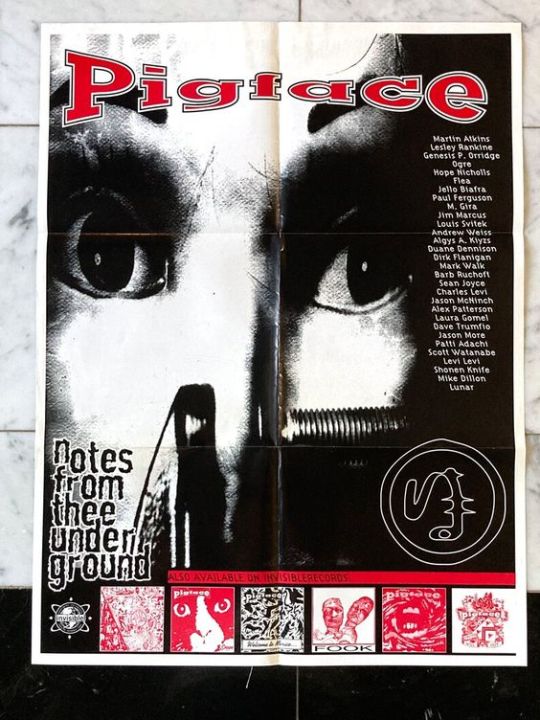
#pigface#lead into gold#paul barker#acid horse#bells into machines#hypo luxa & hermes pan#lard#malekko#ministry#1000 homo djs#pailhead#pink anvil#ptp#puscifer#revolting cocks#the blackouts#ussa#industrial music#industrial#industrial band#indus metal#indus#electronic#electronics#Martin Atkins#Bizarr Sex Trio#Brian Brain#China Dub Soundsystem#Chris Connelly Band#Hyperhead
77 notes
·
View notes
Text
Um. Germany? Indu metal band? Blood and glitter? Metal? Leather? Make up? Fire? METAL VOCALS?
HONEY YES! Now we're talking! HYPED for the Germany live too!
64 notes
·
View notes
Text
Signets and Seals
Seals and signets are devices that leave an impression in some type of soft material, such as wax and clay. They were used to prevent tampering and authentication of items and letters. These seals could be made of metal or stone called the matrix as they would hold the designs. Most of the early seals were cut into the surface, a process called intaglio, so the design is raised on the surface, called a relief. The design will appear reversed on the surface, which is a consideration especially when writing is part of the seal.

By This file was donated to Wikimedia Commons as part of a project by the Metropolitan Museum of Art. See the Image and Data Resources Open Access Policy, CC0, https://commons.wikimedia.org/w/index.php?curid=61209631
The earliest known seals were from the 6th millennium BCE among the Halaf culture who existed from about 6100 BCE to 5100 BCE, but given their complexity, they probably existed earlier. Something similar was used among the Indus Valley Civilization in the mid- to late-3rd millennium BCE. These stamps were replaced with cylinder seals among the Mesopotamian cultures of Sumer and those who lived in and expanded those areas.

By Aoineko - Own work, CC BY-SA 1.0, https://commons.wikimedia.org/w/index.php?curid=47172
In ancient Egypt, signet rings were the form of choice for their seals beginning approximately 2000 BCE. These rings carried the weight of authority with the wearing of them, so these rings were worn by the ruling class. These signet rings were made of metal and typically had the person's name or the Pharaoh's cartouche, an oval with a line at one end and generally contained the praenomen, or throne name, which was one of the five royal names, with their title around the cartouche. This ring was typically worn on the little finger of the non-dominant hand. Some of these rings had swiveling faces with a different design on the opposite side.

source: https://www.britishmuseum.org/collection/object/G_1891-0806-86
The use of signet rings continued with the Greek peoples in about the 6th century BCE, beginning with soft stones and ivory until rotary carving (or drill-type carving) developed, when they shifted to hard stones and gems. Many of the motifs of these rings were based in nature or mythology rather than the name of the person. These rings seemed to be simple adornments rather than identification, as they were among the Egyptians. They were also collected, especially among the rich, and were worn on the little finger. This continued into the Roman society as well.

source: https://www.xzmuseum.com/ecollection_detail.aspx?id=2235
Seals have been used in East Asia since the Qin dynasty (221 BCE). They were used as a form of written identification, establishing their identity. Until the Tang dynasty, they were used to make impressions in clay. Beginning with the Tang dynasty (618 CE), a particular ink made from cinnabar began to be used instead. These are made of hard materials like bronze, soap stone, and jade. There is some evidence of something like a seal, characters on cast bronze vessels from the Shang dynasty (1600-1046 BCE), indicate they might be far older than their widespread use. These seals weren't (and aren't) worn. They often have animals, either mythical or real, on the opposite side. Chinese seals are often square with the person's name on it.
2 notes
·
View notes
Text
Oma + Endless Garden + Hand of Juno à Meyrin
Aujourd'hui sur Blog à part – Oma + Endless Garden + Hand of Juno à Meyrin Le précédent #concert n'était pas le dernier de l'année. comme en témoigne ce concert de Hand of Juno, Endless Garden et Oma à l’Undertown de Meyrin. #ProgMetal #IndustrialMetal
J’avais conclu la vidéo de mon précédent live-report en disant, en substance, qu’à moins d’une surprise ce serait le dernier de l’année. Surprise! Ce n’est pas le cas, comme en témoigne ce concert de Hand of Juno à l’Undertown de Meyrin, accompagné de Endless Garden et d’Oma. Bon, en vrai, ce sont surtout Endless Garden et Oma, classés metal progressif, que je suis venu voir. J’avais découvert…
0 notes
Text

Exploring the top-notch Tool and Die Steel Supplier in Guntur, Andhra Pradesh?
Tool and Die Steel Supplier in APIIC Guntur Industrial Area. Look no further! Virat Special Steels delivers excellence.
Whether it’s tool steel, die steel, mold steel or any other steel requirement, Virat Special Steels stands out as a trusted supplier in Andhra Pradesh!
A significant part of this industrial development is the tool and die steel sector. Tool and die steel are crucial components in manufacturing, used to create a variety of tools, dies, molds, and other essential parts for industries like Forging and Stamping Companies, Metal Fitting, Automotive, Aerospace, and Medical devices.
For tool and die steel requirements in APIIC Guntur, you can consider suppliers like VIRAT SPECIAL STEELS PVT. LIMITED , INDIA . They offer a wide range of tool and die steels, including:
Die Steel (HH 370 – 410 BHN) (DB6 / DIN-1.2714 / AISI L6)
Hot Work Steels (DIN 2343, 2344 / AISI H11, H13)
Plastic Mould Steels (DIN 2738, 2311 / AISI P20)
High Speed Steels (DIN 3243, 3343 / AISI M2, M35)
Cold Work Steels – HCHCr (DIN 2379, 2080 / AISI D2, D3)
Alloy Steels (EN-Series, etc.)
With a state-of-the-art plant in Gurugram and Ludhiana, they ensure quality and reliability. Their strong distribution network across India makes them accessible to customers nationwide.
You can explore their offerings here: https://www.viratsteel.in/locations/tool-and-die-steel-supplier-in-guntur/
Any further queries feel free to contact us : 🌐https://www.viratsteels.com 📨 [email protected] 📞 +91 98140-21775
#ludhiana#india#viratsteels#gurgaon#viratspecialsteels#toolsteelsupplier#gurugram#steel#andhrapradesh#guntur#APIIC#DieSteels#ToolSteel#SteelTrades#H11Steel#H13Steel#DB6Steel#DIN2714
2 notes
·
View notes